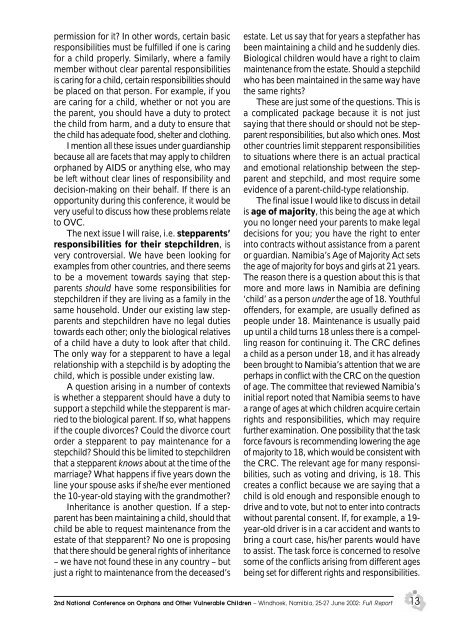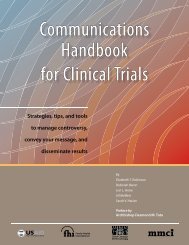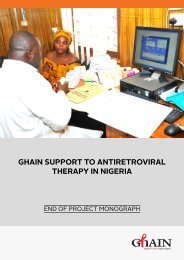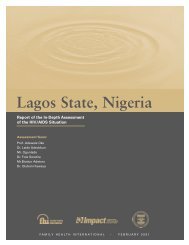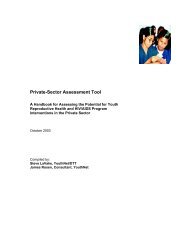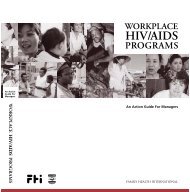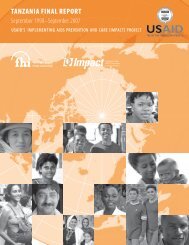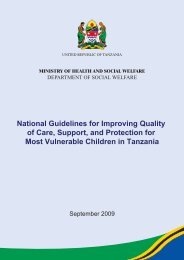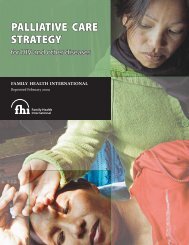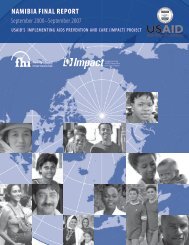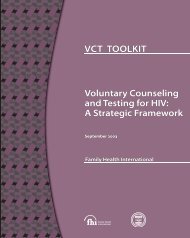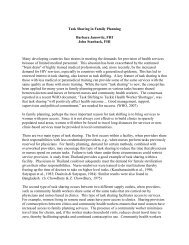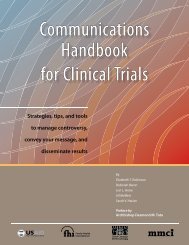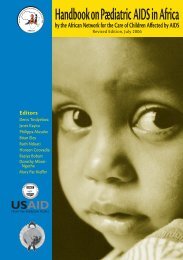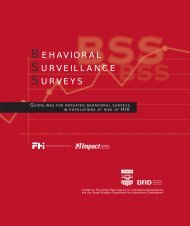2nd National Conference on Orphans and Other ... - FHI 360
2nd National Conference on Orphans and Other ... - FHI 360
2nd National Conference on Orphans and Other ... - FHI 360
You also want an ePaper? Increase the reach of your titles
YUMPU automatically turns print PDFs into web optimized ePapers that Google loves.
permissi<strong>on</strong> for it? In other words, certain basic<br />
resp<strong>on</strong>sibilities must be fulfilled if <strong>on</strong>e is caring<br />
for a child properly. Similarly, where a family<br />
member without clear parental resp<strong>on</strong>sibilities<br />
is caring for a child, certain resp<strong>on</strong>sibilities should<br />
be placed <strong>on</strong> that pers<strong>on</strong>. For example, if you<br />
are caring for a child, whether or not you are<br />
the parent, you should have a duty to protect<br />
the child from harm, <strong>and</strong> a duty to ensure that<br />
the child has adequate food, shelter <strong>and</strong> clothing.<br />
I menti<strong>on</strong> all these issues under guardianship<br />
because all are facets that may apply to children<br />
orphaned by AIDS or anything else, who may<br />
be left without clear lines of resp<strong>on</strong>sibility <strong>and</strong><br />
decisi<strong>on</strong>-making <strong>on</strong> their behalf. If there is an<br />
opportunity during this c<strong>on</strong>ference, it would be<br />
very useful to discuss how these problems relate<br />
to OVC.<br />
The next issue I will raise, i.e. stepparents’<br />
resp<strong>on</strong>sibilities for their stepchildren, is<br />
very c<strong>on</strong>troversial. We have been looking for<br />
examples from other countries, <strong>and</strong> there seems<br />
to be a movement towards saying that stepparents<br />
should have some resp<strong>on</strong>sibilities for<br />
stepchildren if they are living as a family in the<br />
same household. Under our existing law stepparents<br />
<strong>and</strong> stepchildren have no legal duties<br />
towards each other; <strong>on</strong>ly the biological relatives<br />
of a child have a duty to look after that child.<br />
The <strong>on</strong>ly way for a stepparent to have a legal<br />
relati<strong>on</strong>ship with a stepchild is by adopting the<br />
child, which is possible under existing law.<br />
A questi<strong>on</strong> arising in a number of c<strong>on</strong>texts<br />
is whether a stepparent should have a duty to<br />
support a stepchild while the stepparent is married<br />
to the biological parent. If so, what happens<br />
if the couple divorces? Could the divorce court<br />
order a stepparent to pay maintenance for a<br />
stepchild? Should this be limited to stepchildren<br />
that a stepparent knows about at the time of the<br />
marriage? What happens if five years down the<br />
line your spouse asks if she/he ever menti<strong>on</strong>ed<br />
the 10-year-old staying with the gr<strong>and</strong>mother?<br />
Inheritance is another questi<strong>on</strong>. If a stepparent<br />
has been maintaining a child, should that<br />
child be able to request maintenance from the<br />
estate of that stepparent? No <strong>on</strong>e is proposing<br />
that there should be general rights of inheritance<br />
– we have not found these in any country – but<br />
just a right to maintenance from the deceased’s<br />
estate. Let us say that for years a stepfather has<br />
been maintaining a child <strong>and</strong> he suddenly dies.<br />
Biological children would have a right to claim<br />
maintenance from the estate. Should a stepchild<br />
who has been maintained in the same way have<br />
the same rights?<br />
These are just some of the questi<strong>on</strong>s. This is<br />
a complicated package because it is not just<br />
saying that there should or should not be stepparent<br />
resp<strong>on</strong>sibilities, but also which <strong>on</strong>es. Most<br />
other countries limit stepparent resp<strong>on</strong>sibilities<br />
to situati<strong>on</strong>s where there is an actual practical<br />
<strong>and</strong> emoti<strong>on</strong>al relati<strong>on</strong>ship between the stepparent<br />
<strong>and</strong> stepchild, <strong>and</strong> most require some<br />
evidence of a parent-child-type relati<strong>on</strong>ship.<br />
The final issue I would like to discuss in detail<br />
is age of majority, this being the age at which<br />
you no l<strong>on</strong>ger need your parents to make legal<br />
decisi<strong>on</strong>s for you; you have the right to enter<br />
into c<strong>on</strong>tracts without assistance from a parent<br />
or guardian. Namibia’s Age of Majority Act sets<br />
the age of majority for boys <strong>and</strong> girls at 21 years.<br />
The reas<strong>on</strong> there is a questi<strong>on</strong> about this is that<br />
more <strong>and</strong> more laws in Namibia are defining<br />
‘child’ as a pers<strong>on</strong> under the age of 18. Youthful<br />
offenders, for example, are usually defined as<br />
people under 18. Maintenance is usually paid<br />
up until a child turns 18 unless there is a compelling<br />
reas<strong>on</strong> for c<strong>on</strong>tinuing it. The CRC defines<br />
a child as a pers<strong>on</strong> under 18, <strong>and</strong> it has already<br />
been brought to Namibia’s attenti<strong>on</strong> that we are<br />
perhaps in c<strong>on</strong>flict with the CRC <strong>on</strong> the questi<strong>on</strong><br />
of age. The committee that reviewed Namibia’s<br />
initial report noted that Namibia seems to have<br />
a range of ages at which children acquire certain<br />
rights <strong>and</strong> resp<strong>on</strong>sibilities, which may require<br />
further examinati<strong>on</strong>. One possibility that the task<br />
force favours is recommending lowering the age<br />
of majority to 18, which would be c<strong>on</strong>sistent with<br />
the CRC. The relevant age for many resp<strong>on</strong>sibilities,<br />
such as voting <strong>and</strong> driving, is 18. This<br />
creates a c<strong>on</strong>flict because we are saying that a<br />
child is old enough <strong>and</strong> resp<strong>on</strong>sible enough to<br />
drive <strong>and</strong> to vote, but not to enter into c<strong>on</strong>tracts<br />
without parental c<strong>on</strong>sent. If, for example, a 19year-old<br />
driver is in a car accident <strong>and</strong> wants to<br />
bring a court case, his/her parents would have<br />
to assist. The task force is c<strong>on</strong>cerned to resolve<br />
some of the c<strong>on</strong>flicts arising from different ages<br />
being set for different rights <strong>and</strong> resp<strong>on</strong>sibilities.<br />
<str<strong>on</strong>g>2nd</str<strong>on</strong>g> <str<strong>on</strong>g>Nati<strong>on</strong>al</str<strong>on</strong>g> <str<strong>on</strong>g>C<strong>on</strong>ference</str<strong>on</strong>g> <strong>on</strong> <strong>Orphans</strong> <strong>and</strong> <strong>Other</strong> Vulnerable Children – Windhoek, Namibia, 25-27 June 2002: Full Report<br />
13


